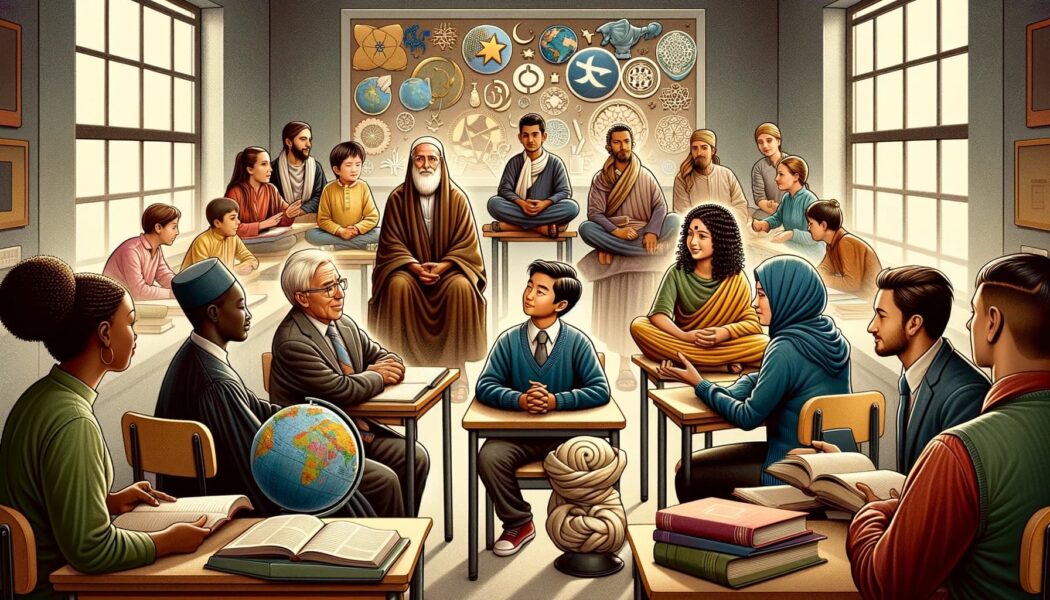Understanding the Intersection of Religion and Education
Religion has always played a significant role in shaping cultures and societies. Its influence extends to various aspects of life, including education. This article explores the multifaceted relationship between religion and education, particularly focusing on how religious beliefs impact the teaching of science and the overall educational landscape. Additionally, it delves into the importance of studying world religions in the context of globalization and cultural exchange.
This exploration not only highlights conflicts and controversies but also reveals potential pathways for integrating religious perspectives with scientific understanding, fostering a more inclusive and holistic educational environment.
The Impact of Religion on Science Education
The relationship between religion and science has been a subject of debate for centuries. In many educational systems, religious beliefs influence the curriculum and the way scientific concepts are taught. Some schools integrate religious perspectives into their science classes, which can shape students’ understanding of scientific theories and principles. This integration can lead to a diverse range of interpretations and acceptance levels of scientific facts.
For instance, the teaching of evolution versus creationism is a common point of contention in many countries. In some regions, religious doctrines strongly oppose the theory of evolution, leading to its exclusion or modification in the science curriculum. This dynamic illustrates the ongoing struggle between upholding religious values and providing a comprehensive scientific education.
Furthermore, religiously affiliated schools often incorporate faith-based perspectives into their science instruction, which can affect how subjects like biology, physics, and environmental science are taught. While this approach can enrich students’ learning experiences by providing a broader context, it can also present challenges when scientific evidence contradicts religious teachings.
Another aspect to consider is the role of religious beliefs in shaping attitudes towards scientific advancements and technologies. For example, topics such as genetic engineering, stem cell research, and climate change often intersect with moral and ethical considerations rooted in religious values. Educators must navigate these complex issues sensitively, balancing respect for religious beliefs with the need to impart accurate scientific knowledge.
The Value of Studying World Religions
In today’s interconnected world, understanding different religions is crucial for fostering global awareness and cultural sensitivity. Studying world religions enables students to appreciate the diversity of beliefs and practices around the globe. It promotes tolerance and empathy, which are essential for peaceful coexistence in a multicultural society.
Moreover, an education that includes world religions helps students develop critical thinking skills as they compare and contrast different belief systems. This broader perspective prepares them for global citizenship, where they can engage respectfully and knowledgeably with people from various religious backgrounds.
The study of world religions also provides insights into historical and contemporary issues that shape global events. For instance, understanding the religious motivations behind certain conflicts or political movements can offer a deeper comprehension of current affairs. It can also highlight the positive contributions of religious communities to social justice, humanitarian efforts, and cultural preservation.
List of Influences of Religion on Education:
- Curriculum design and content
- Teaching methodologies
- Student’s worldview and acceptance of scientific theories
- Promotion of moral and ethical values
- Encouragement of critical thinking through comparative religious studies
Examples of Religious Influence on Science Education:
| Aspect | Religious Influence | Scientific Perspective |
| Creation of the Universe | Creationism (God created the universe) | Big Bang Theory |
| Origin of Species | Intelligent Design | Theory of Evolution |
| Age of the Earth | Young Earth Creationism | Geological Time Scale (billions of years) |
Frequently Asked Questions (FAQ)
1. How does religion impact education?
Religion can shape the curriculum, influence teaching methodologies, and affect students’ acceptance of scientific theories.
2. Why is it important to study world religions?
Studying world religions fosters global awareness, cultural sensitivity, and critical thinking skills, which are essential for peaceful coexistence in a multicultural society.
3. Can religious beliefs and scientific education coexist?
Yes, they can coexist, but it requires a balanced approach that respects religious values while providing a comprehensive scientific education.
4. What are some examples of religious influence on science education?
Examples include the teaching of creationism versus evolution and differing views on the age of the Earth.
For more information on digital defenses in the realm of cybersecurity, you can explore this guide to cybersecurity serials. Additionally, if you are interested in obtaining grants for software development, visit this resource on grants for software development.

